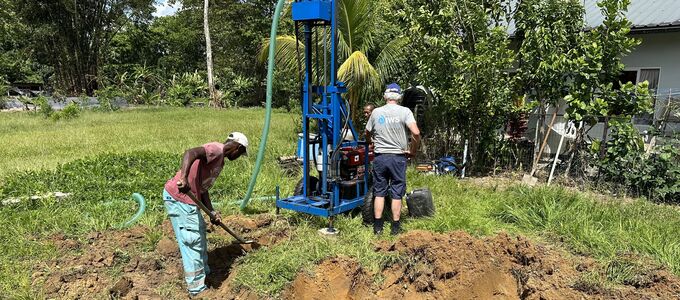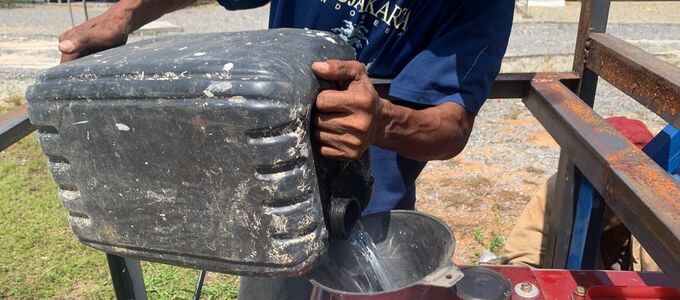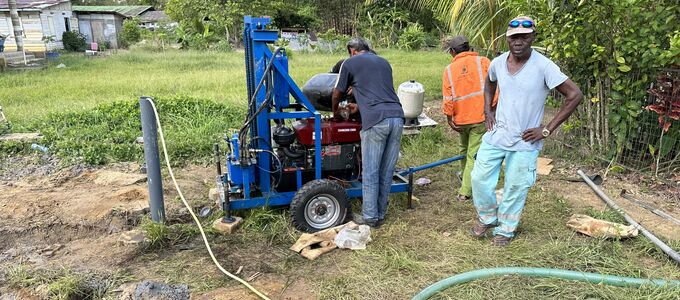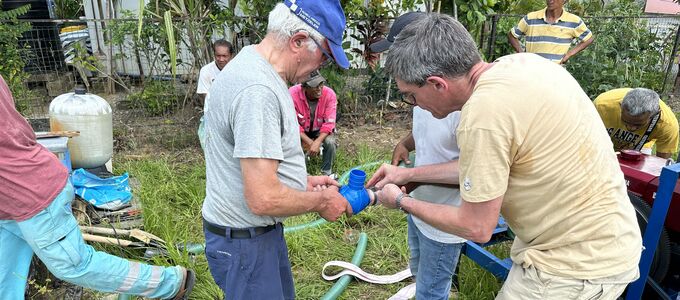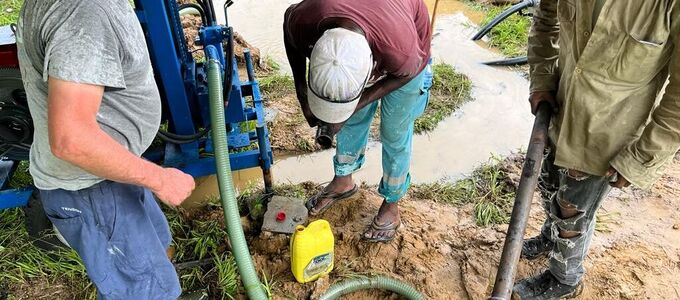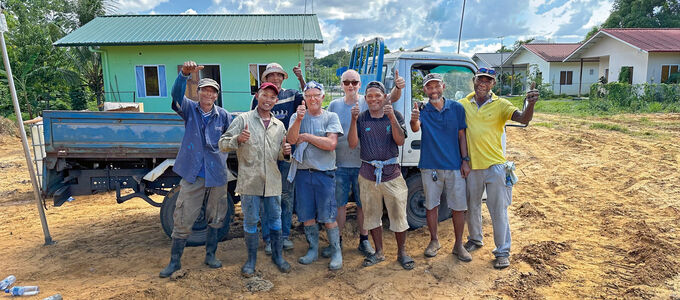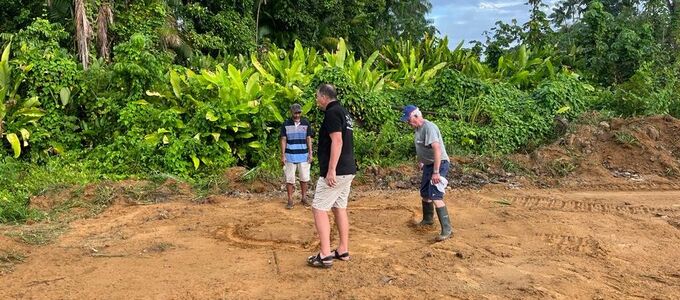
They came wearing shorts, a shirt, a baseball cap, and rubber boots—sometimes you have to dress in work clothes to do the work of God. And it was for precisely this purpose that a number of members from the Netherlands crossed the sea to visit South America.
Off to Welbedacht
It’s 30 degrees outside and there is a lot of work ahead: together with the other Netherlanders, Arie van der Linden gets out of the small, humming bus and smiles. The 78-year-old is in a good mood and comes equipped with plenty of experience in the field of drilling for water. He is finally ready to perform a task for which the New Apostolic Church of the Netherlands has been preparing for months.
First, the guests from Europe take a look at the blue metal frame on two wheels that is waiting for them in Welbedacht. It has had a long journey, having recently arrived by container from China. “There are two drilling machines with diesel engines, each with 24 horsepower,” says Ruud Vis, who is also from the Netherlands. As a Bishop of the New Apostolic Church, the 63-year-old is responsible for the ten congregations in the Commewijne district in Suriname and is therefore someone who can get things done in the country: time runs differently in Suriname. If you want to get something done here, you have to come up with your own solutions—which in this case includes supplying clean drinking water. And that is exactly what Ruud Vis and Arie van der Linden will be looking for today.
The New Apostolic Church of the Netherlands has been active in the country on the east coast of South America for 35 years. In 1997, it founded the Corantijn Foundation, which is named after one of the longest rivers in the country and supports the people of Suriname regardless of skin colour or religion. Ruud Vis is the foundation’s deputy Chairman and knows that this form of aid often involves things that people in the global north take for granted: education, training, but also a reliable supply of water.
Help for the poorest
“There are ten New Apostolic congregations in Suriname. Over many years, we have built eleven houses on the site in Welbedacht, which are rented out as social housing,” explains Bishop Vis. The New Apostolic Church does not keep the rental income. These funds benefit the whole village community. In addition, the village is also home to a New Apostolic Church and a second-hand shop run by the foundation. “All the houses have electricity, but even after six years, the government has not managed to provide water connections,” says Ruud Vis. Due to the lack of available alternatives, residents have been getting their water from an open well or collecting rainwater in barrels. It was used for everything, including drinking water, but: “The water was brown and contaminated with heavy metals such as mercury,” says the Bishop.
The Corantijn Foundation decided to take the initiative in remedying the situation, and thus called on the expertise of a company in the Netherlands that specialises in water supply—a company where Arie van der Linden also used to work. The company not only provided the necessary expertise, but also sponsored the two drilling machines that the foundation bought from a Chinese company.
Bring on the water!
the machines and check that it is operating properly. First an excavator digs a hole that is filled with rainwater, then van der Linden and Nijhof position the drill over it and turn on the diesel engine. The machine rattles, stinks, blows black clouds into the air—and then begins to eat its way, centimetre by centimetre, through the thick clay and ever deeper into the ground. After around 24 metres, the men first come across a layer of sand, and a good 16 metres after that they find what they have been hoping for: water! “It took a little while to drill out the dirty water, but clear water soon began bubbling out of the pipes,” says Bishop Vis. The people erupt in loud cheers.
Members supporting members—and others
With donations that come primarily from New Apostolic Christians, the Corantijn Foundation has built numerous houses and even a polyclinic in Suriname. But it is also about the simplest things: the foundation regularly sends school furniture, household goods, diapers, and medicines to Suriname. Four times a year, containers with used clothing arrive from Europe. The residents of Welbedacht sell this second-hand clothing in their small shop and earn a little extra money that way. Apart from that, most people live off the agricultural goods that they produce in the fields, mainly for their own use, but also for sale. “Many people have small street shops, and some of the customers come from the neighbouring, wealthier country of Guyana and stock up in Suriname,” says Ruud Vis.
The work goes on
A total of three drinking water wells have been in operation since November 2023. The water from all sources has passed its first quality tests, and further samples are being examined in the Netherlands. In a few weeks, Ruud Vis will travel back to Suriname and drill a fourth well, this time in the village where the polyclinic is located. The helpers from the Netherlands will then receive support from the local people: in the autumn, van der Linden and Nijhof not only drilled wells, but also trained several Surinamese people to be drillers and assistant drillers—certificate included.
The Corantijn Foundation has completed an important project by drilling these wells for drinking water, but its work continues. Support remains high, says Bishop Ruud Vis: around 80 percent of the donations come from New Apostolic believers, while the remaining 20 percent is from external donors. “Our foundation is very well known in the Netherlands,” he says. The 63-year-old will find new projects that he will implement some 8,000 kilometres from his home—whether in a suit or in rubber boots…






